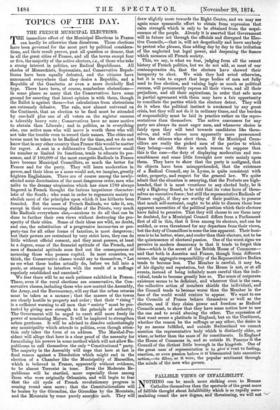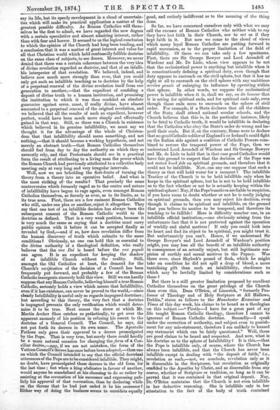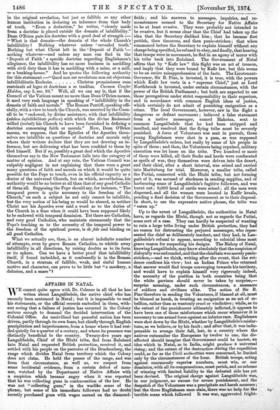FALLIBLE VIEWS OF INFALLIBILITY.
NOTHING can be much more striking even to Roman Catholics themselves than the spectacle of the great mass of fallible thought about Infallibility which is so rapidly accu- mulating round the new dogma, and threatening, we will not 's say its life, but its speedy envelopment in a cloud of uncertain- ties which will make its practical application a matter of the greatest possible difficulty. As Roman Catholics will them- selves be the first to admit, we have regarded the new dogma with a certain speculative and almost admiring interest, rather than with fear and horror. It seemed to us the logical conclusion to which the opinion of the Church had long been tending, and a conclusion that it was a matter of great interest and value for all that Christian world which held confessedly fallible doctrine on the same class of subjects, to see drawn. Moreover, we never denied that there was a certain coherence between the very idea of divine revelation regarded as doctrine, and that of an infalli- ble interpreter of that revelation. We believed, indeed, and believe now much more strongly than ever, that you could only get such an infallible teaching as to doctrine by the help of a perpetual renewal of the divine revelation itself from one generation to another,—that the expedient of confiding a deposit of divine truth to a human institution, and promising the institution to which it was thus confided an absolute guarantee against error, must, if really divine, have almost amounted to a perpetual renewal of the original revelation, and we believed that all the results of such an expedient, however perfect, would have been much more simply and effectually gained in that way. Still, as there was a Church in existence which believed in its genuine infallibility, we must say we thought it for the advantage of the whole of Christen- dom that that infallibility should mean something, and not nothing,—that it should become a working hypothesis, and not merely an abstract truth—that Roman Catholics themselves should feel from day to day the authority on which they so earnestly rely, and that Protestants should see in a practical form the result of attributing to a living man the power which the Roman Church had previously attributed to a collective body meeting only at very long and very irregular intervals. Well, now we are beholding the first-fruits of turning the theory from a theory into an operative belief. And what is the most striking of the results? That precisely the same controversies which formerly raged as to the centre and nature of infallibility have begun to rage again, even amongst Roman Catholics themselves, as fiercely as ever, as to its limits, as to its true area. First, there are a few eminent Roman Catholics who still, under one plea or another, reject it altogether. They say that one test of an infallible decision has always been the subsequent consent of the Roman Catholic world to the doctrine as defined. That is a very weak position, because it is very much the same as saying that a doctrine must carry public opinion with it before it can be accepted finally as revealed by God,—and if so, how does revelation differ from the human discovery of truth which submits to the same conditions? Obviously, no one can hold this as essential to the divine authority of a theological definition, who really believes that the vox Del is heard before the vox populi can agree. It is an expedient for keeping the shadow of an infallible Church without the reality. Still, amongst the Old Catholics at least, the demand for the Church's verification of the decision of a Council has been frequently put forward, and probably a few of the Roman Catholic insurgents sincerely hold this view. Still we can hardly suppose that any Roman Catholic, believing himself a true Roman Catholic, seriously holds a view which means that Infallibility, even if it has existence, can never be proved to the world,—since clearly Infallibility is useful only as regards impugned doctrines ; but according to this theory, the very fact that a doctrine is impugned prevents the only verification which would deter- mine it to be true. Next comes the straw at which Mr. Martin Archer Shea catches so pathetically, to get over the apparent anomaly of his position in refusing his assent to the doctrine of a General Council. The Council, he says, did not put forth its decrees in its own name. The Apostolic Fathers only gave their approval to a decree promulgated by the Pope. That is very true, but surely there could hardly be. . a more natural occasion for clanging the form of a Con- ciliar decree,—nay, if we are not mistaken, the form of the Vatican Council's decree has once before been adopted,—than one
on which the Council intended to say that the official doctrinal utterances of the Pope are to be considered infallible. They might, no doubt, have promulgated these decrees in the old form for the last time; but when a king abdicates in favour of another, would anyone be scandalised at his choosing to do so rather by assisting at the coronation of his successor and expressing pub- licly his approval of that coronation, than by declaring while on the throne that he had just ceded it to his successor I Either way of doing the business seems to outsiders equally good, and entirely indifferent as to the meaning of the thing done.
So far, we have concerned ourselves only with what we may call the excuses of Roman Catholics who neither wish to say they have lost faith in their Church, nor to act as if they kept faith in it. But now we come to the cloud of views which many loyal Roman Catholics are putting forward in rapid succession, as to the proper limitation of the field of infallibility. Of these we can take only a few specimens. First, there are Sir George Bowyer and Lord Arundell of Wardour and Mr. De Lisle, whose view appears to be not that the ecclesiastical power is anything but infallible when it is conscientiously defining a spiritual duty, even though that duty appears to encroach on the civil sphere, but that it has no right at all to encroach on the civil sphere with any ambitious arriere pensie of enlarging its influence by operating within that sphere. In other words, we suppose the ecclesiastical power is infallible when it is, shall we say, on its honour that it is acting for spiritual ends, and for spiritual ends only, even though those ends seem to encroach on the sphere of civil order. For example, if a State declares that all the children of the State. shall attend national secular schools, and the Church believes that this is, in the particular instance, likely to be fatal to Catholic truth, it would be infallible in declaring that the Catholics who obey the State's order do wrong and im- peril their souls. But if, on the contrary, Rome were to declare that no good Catholic soldier of England's or Ireland's could fight on the Italian side against a coalition of Catholic Powers com- bined to restore the temporal power of the Pope, then we understand Lord Arundell of Wardour and Sir George Bowyer and Mr. de Lisle to hold that in that ease good Catholics would have fair ground to suspect that the decision of the Pope was not rested bond fide on spiritual grounds, and therefore that it could not be infallible. Now, can any one suppose that such a theory as that will hold water for a moment The infallible Teacher of the Church is to be held infallible only when he keeps in the spiritual sphere, but he is not to be held infallible as to the fact whether or not he is actually keeping within the spiritual sphere Nay, if the Pope's motives are liable to suspicion, if you have room to doubt whether or not he is really judging on spiritual grounds, then you may reject his decision, even though it claims to be spiritual and infallible, on the ground that you believe its motive to be temporal, and therefore its teaching to be fallible Here is difficulty number one, in an infallible official institution,—one obviously arising from the unfortunate fact that it is not protected against the operation of worldly and sinful motives If only you could look into its heart and find its object to be spiritual, you might trust it. But unfortunately you can't. Hence, if we understand Sir George Bowyer's and Lord Arundell of Wardour's position aright, you may lose all the benefit of an infallible authority in consequence of an actually unjust, but still legitimate sus- picion of earthly and carnal motives in the Papacy. Was there ever, since Shylock's pound of flesh, which he might take on condition he did not spill a drop of blood, a more tantalising gift than such an infallibility, obedience to which may be lawfully limited by considerations such as these?
But there is a still greater limitation proposed by excellent Catholics themselves on the great privilege of the Church than even this. Dean O'Brien of Limerick, "formerly Pro- fessor of Theology and of Holy Scripture at All Hallows Dublin," states as follows to the Manchester Examiner and Times of this day week, his claims to be heard as a theologian on this subject :—" Firstly—I have for a great part of my life taught Roman Catholic theology, therefore I cannot be ignorant of Roman Catholic doctrine. Secondly—I speak under the correction of authority, and subject even to punish- ment for any mis-statement, therefore I am unlikely to hazard any statement which can be fairly questioned." Well, those are good claims to be heard and respected. And now, what is his doctrine as to the sphere of Infallibility? It is this,—that the Pope is infallible only, of course, where the Church has always been infallible and that the Church has never been infallible except in dealing with "the deposit of faith," i.e., revelation as such,—not, we conclude, revelation only as it is discernible in the Scriptures, but revelation as originally confided to the Apostles by Christ, and as discernible from any source whether of Scripture or tradition, so long as it can be proved that it was contained in that original deposit. Nay, Dr.•O'Brien maintains that the Church is not even infallible in her deductive reasoning. She is infallible only in her attestation to the fact of the body of truth contained in the original revelation, but just as fallible as any other human institution in deducing an inference from that body of truth. "Even a deduction," he writes, "clearly made from a doctrine is placed outside the domain of infallibility." Dean O'Brien puts his doctrine with a good deal of strength
What is that domain—the domain of the whole Church's infallibility? Nothing whatever unless 'revealed truth.' Nothing but what Christ left in the 'Deposit of Faith '- nothing whatever—and unless any man can find in the Deposit of Faith' a specific doctrine regarding Englishmen's allegiance, the infallibility has no more business in meddling with civil duty than it has in meddling with a mine, or a mill, or a banking-house." And he quotes the following authority for this statement Quod non eat revelatum non est objectum
infallibilitatis Ecclesise Christus promissiones seas restrinxit ad leges et doctrinas a se traditas. Cursum Confer Holden, cap 3, sec. 99." Well, all we can say is, that if the Council of the Vatican meant no more than Dean O'Brien means, it used very rash language in speaking of "infallibility in the 4omain of faith and morals." The Roman Pontiff, speaking offi- Molly, with a view to teach the Church, was asserted by the Coun- cil to be "endowed, by divine assistance, with that infallibility (eddem infallibilitae pollere) with which the divine Redeemer -willed (vo/uit) his Church to have been furnished in defining a -doctrine concerning faith or morals." Now, Dean O'Brien means, we suppose, that the Epistles of the Apostles them- selves are infallible on questions of doctrine and morals only where their writers declare that they are not drawing an in- ference, but are delivering what has been confided to them by ,God himself. But if so, possibly a great deal which the Apostles themselves say in the New Testament falls into the category of matter of opinion. And at any rate, the Vatican Council was culpably negligent in not explaining that there were a great many questions of faith and morals on which it would be quite possible for the Pope to touch, even in his official capacity as a -,doctor of the universal Church, but on which, nevertheless, his authority would be no better at all than that of any good Catholic of them all. Supposing the Pope should say, for instance, "The temporal power is quite necessary to the freedom of the -Church," on such a subject he not only cannot be infallible, but the very notion of his being so would be absurd, as neither Christ nor his Apostles ever said a word as to the duties of the Church in a time when it could have been supposed likely to be endowed with temporal dominion. Yet there are Catholics, and very good Catholics, who maintain strenuously that the Pope's teaching as to the necessity of the temporal power to the freedom of the spiritual power, is de fide and binding on all good Catholics.
What we actually see, then, is an almost indefinite number -.of attempts, even by grave Roman Catholics, to whittle away infallibility in all directions, by raising doubts as to its form
• or its sphere. Can we have a better proof that infallibility itself, if found imbedded, as it confessedly is in the Boman Church, in a stratum of fallible, weak, and sinful human motive and character, can prove to be little but "a mockery, a „delusion, and a snare"?








































 Previous page
Previous page